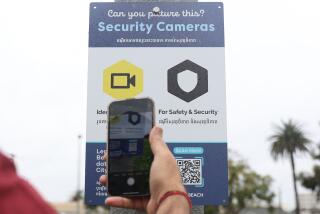Los Angeles, From A to Z : USC Professor Heads Multimedia Database on L.A. : Next L.A. / A Look at issues, people and ideas helping to shape the emerging metropolis
- Share via
History professor Philip Ethington heads a USC effort to create the biggest computerized database about the Los Angeles metropolis. Information System Los Angeles, or ISLA, will be multimedia: Its photos, films, research studies and other materials about Los Angeles will be available to researchers on the worldwide Internet.
Ethington created the first digital copy of Darwin’s 1859 “On the Origin of Species.” He is the author of “The Public City: The Political Construction of Urban Life in San Francisco” (Cambridge University Press, 1994).
He exchanged e-mail with Times researcher Nona Yates:
I am a historian of urban politics, society and culture who has used computer data to study Boston, New York City, Chicago and San Francisco. When I joined the faculty here, I naturally intended to research Los Angeles, so I began asking around.
Fellow scholars in geography, the School of Urban and Regional Planning, sociology and political science began brainstorming the ideal computer resource to enable all kinds of people--not just scholars, but schoolchildren, policy-makers, community activists and journalists--to “ask questions” about Los Angeles (defined broadly as the 60-mile radius around Downtown, which includes several counties and almost half the population of the state).
As more research is done about the city, that research will be added to ISLA and make even more powerful and interesting analyses possible. Scholars, the municipal government, even presidential commissions, have been studying Los Angeles for more than a century, but the research does not accumulate. Government reports conducted at great expense are forgotten after a year or so.
People have to go to great effort to ask even the most frequent questions, such as: “How has the South-Central district changed since the Watts rebellion in 1965?”
The ISLA system will be free and open, available on the World Wide Web, to answer this and an infinite number of other questions. In addition to the rich USC materials we will make accessible (such as the 1.5 million historical photographs of Los Angeles in the USC archives), ISLA will also serve to tie together regional archives and neighborhood museums.
In short, Los Angeles has recently become the paradigmatic city for the problems and promise of the 21st Century: ISLA will be the most powerful way to study L.A. We expect a prototype to be available by the end of the summer.
The e-mail address for ISLA is: islaexec@calvin.usc.edu
More to Read
Sign up for Essential California
The most important California stories and recommendations in your inbox every morning.
You may occasionally receive promotional content from the Los Angeles Times.












